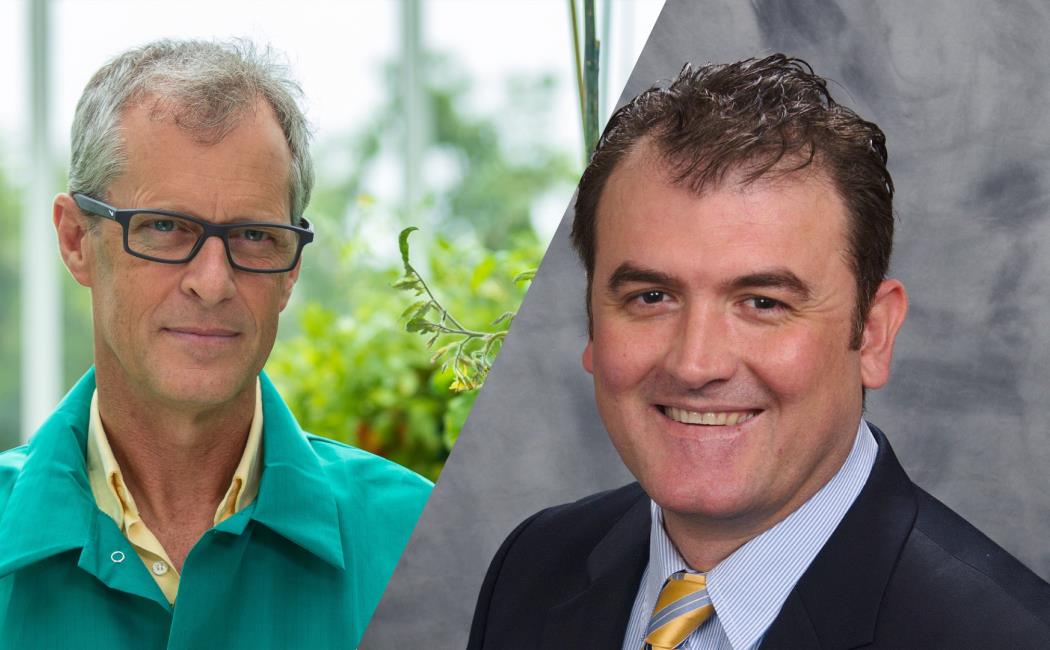Detail

CDA Seminar: Mark Tester & Murat Kacira
Professors Mark Tester (KAUST) and Murat Kacira (UArizona) join us to introduce their labs and describe current research projects.
Mark Tester & Murat Kacira
Tuesday, June 8
7:00 – 8:30 pm
On Zoom
Genetics of salinity tolerance traits in crops – and developing saltwater-based agricultural systems
Speaker: Mark Tester
Associate Director, Center for Desert Agriculture (CDA)
Professor, Plant Science, KAUST
Abstract
One-third of the world’s food is produced under irrigation. This is challenged by over-exploitation of water resources and global environmental change. This talk will focus on the use of forward genetics to discover genes affecting salinity tolerance in barley, rice, and tomatoes, along with some recent genomics in quinoa, a partially domesticated crop with high salinity tolerance. Rather than studying salinity tolerance as a trait in itself, we dissect salinity tolerance into a series of components that are hypothesised to contribute to overall salinity tolerance.
For tomatoes, the focus is on association genetics of tolerance in wild tomatoes. Tomatoes have been phenotyped in The Plant Accelerator® and in the field for three years, and analyses are currently in progress. For quinoa, the genome has been sequenced to high quality, and now about 1,000 lines have been re-sequenced. Up to 1,300 lines are being phenotyped in The Plant Accelerator and over a dozen field trial sites globally to identify natural variation in a range of domestication and tolerance traits. The application of this approach provides opportunities to significantly increase abiotic stress tolerance in crops and thus contribute to increasing agricultural production in many regions.
A complementary approach to increasing tolerance of crops to salinity is to domesticate plants that have high salinity tolerance. We are starting to take this approach, working on species such as Salicornia, which produces an oil-rich seed whilst growing in undiluted seawater.
To deliver our research, we have now established a company, Red Sea Farms LLC, where we combine engineering and plant science to develop and use saltwater-based agricultural systems, to reduce the water and carbon footprint of modern agriculture, and to do this in an environmentally sustainable and economically viable way.
About the Speaker
The aim of research in Dr. Mark Tester’s research group, The Salt Lab, is to understand molecular processes that allow plants to survive in suboptimal conditions, and use this to improve abiotic stress tolerance of crops. Research has traditionally focused on improving salinity tolerance of existing crops, such as wheat and rice; but, more recently, attention has increasingly turned to working with plants that are already highly salt tolerant, and domesticating them. The first target for this work has been quinoa, and The Salt Lab led the publication of the quinoa genome sequence in Nature in 2017. Salicornia is also a plant that can grow in full seawater and produce an oil-rich seed that has also been worked on over the past few years. The third focus of attention has been the wild relatives of tomatoes, where outcomes can be rapidly delivered through grafting of commercial scions on to vigorous, salt-tolerant rootstocks. Research outputs are now being delivered through a company co-founded by Mark Tester and Ryan Lefers, Red Sea Farms.
Last year, Mark Tester was Head of the Food Sector at NEOM, where he led the development of a strategic plan for the Food Sector of that new hi-tech city of the future. In 2018 and 2019, Mark Tester was a Clarivate highly cited researcher (he was cited nearly 5,000 times in 2020); and in 2019 he won the Khalifa International Award for Distinguished Innovative Studies and Modern Technology. He is an Honorary Professor at the University of Adelaide and was a keynote speaker at the International Quinoa Research Symposium, August 2020 (https://www.youtube.com/watch?v=aaXoVqkmQYo&t=1614s).
Title: Sustaining the Future through Controlled Environment Agriculture
Speaker: Murat Kacira
Director, Controlled Environment Agriculture Center (CEAC)
Professor, Biosystems Engineering, University of Arizona
About the Speaker
Murat Kacira is the director of the Controlled Environment Agriculture Center and a professor in the Biosystems Engineering Department at the University of Arizona. He received his B.S. degree in Agricultural Engineering in Cukurova University in Turkey and M.Sc. and Ph.D. degrees in Food, Agricultural, and Biological Engineering from The Ohio State University in the USA. His research involves automation, environmental control, alternative energy integrated CEA systems, and resource use optimization in controlled environment agriculture systems including greenhouses and vertical farming-based plant factories with artificial lighting. He is a member of American Society of Agricultural and Biological Engineers (ASABE) and International Society for Horticultural Science (ISHS). He serves as Chair of the Division Precision Horticulture Engineering under ISHS.
Part of the KAUST-UArizona Summer Seminar Series – Towards a Joint Center for Sustainable Agriculture in Desert Environments. Click here to view the full schedule.
Please contact cda.communications@kaust.edu.sa to request access
This event occurred in the past. You can watch the recording on our YouTube channel.
Speakers
Mark Tester
Associate Director, Center for Desert Agriculture (CDA); Professor, Plant Science, KAUST
Murat Kacira
Director, Controlled Environment Agriculture Center (CEAC); Professor, Biosystems Engineering, University of Arizona